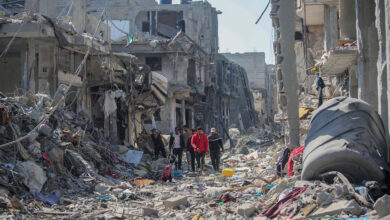
Eleven years since the death of iconic Palestinian leader Yasser Arafat, the Palestinian political stage remains wracked by division, while the Palestinian people continue to suffer from Israeli escalations and violence.
The 11th anniversary of Arafat’s death on November 11 comes this year amid what some are calling a new Palestinian “Intifada” (“uprising”) in the Israeli-occupied West Bank and East Jerusalem, which has left scores of Palestinians dead and hundreds injured.
According to the Palestinian Health Ministry, the total number of Palestinians killed by Israeli forces since October 1 now stands at 80, including 17 children.
For many, Arafat is best remembered for his ability to unify the Palestinian street.
“Arafat succeeded in leading Palestinians of different political tendencies,” Sameer Awad, a political science professor at Ramallah’s Birzeit University, told Anadolu Agency.
“During his lifetime, Palestinian political discourse was united, both internally and externally,” he said.
Awad pointed out that, since Araft’s death, Israel had continued to seize more Palestinian land in the occupied West Bank and East Jerusalem, on which it had built hundreds of Jewish-only settlement units.
The Jewish state, he added, had also failed to respect the terms of the Oslo Accords, signed between Arafat and late Israeli Prime Minister Yizhak Rabin.
Signed on September 13, 1993, the accords represented the first direct agreement between Arafat’s Palestinian Liberation Organization (PLO) and the Israeli government.
According to Awad, Palestinians should learn from Arafat’s experiences in dealing with the Israeli occupation.
“Israel always works against peace,” he said. “And it doesn’t accept a strong leader who can unite Palestinians.”
In 1999, the US-backed Camp David peace talks collapsed. One year later, the Second Intifada (2000-2005) erupted, in which more than 4,400 Palestinians were killed and thousands injured.
Arafat died in 2004, at a time when the Palestinian territories were run by a single administration under a single leader.
Three years later, the Palestinian body politic was rent asunder, with the West Bank being run by the secular, Fatah-led Palestine Authority (which had been borne of the Oslo Accords) and the Gaza Strip being run by resistance faction Hamas.
Abdul Majid Swealim, another Palestinian political science professor, told Anadolu Agency that for the past nine years, the Palestinians have groaned under internal conflict and division because they lacked a leader — like Arafat — able to embrace Palestinians of all political tendencies.
Palestinians, he went on to lament, no longer have a unified leadership able to deal with the crises at hand, including recent Israeli escalations against East Jerusalem’s Al-Aqsa Mosque and Israel’s devastating military campaigns against the blockaded Gaza Strip.
Swealim believes Arafat's death left a void in Palestinian society — one that has left the Palestinians divided and alone in a region currently plagued by war and chaos.
On November 11, 2004, Arafat died in France — under highly suspicious circumstances — at the age of 75. At the time, doctors were unable to determine the exact cause of his death.
In November of 2012, forensics experts from Russia, France and Switzerland exhumed Arafat’s body, from which they took samples in hopes of determining how the iconic leader had died.
The experts ruled out the assassination theory, saying the presence of Radon gas — a radiant natural gas — in the external environment may have led to the high level of radiation found in Arafat’s body.
In an investigation broadcast by Qatar’s Al-Jazeera television channel, the Swiss Institute for Radiation Physics revealed the presence of radioactive polonium in Arafat's remains.
Inspiration
Regardless of how he died, however, Arafat is still remembered as a source of inspiration for a new generation of Palestinians.
“Yasser Arafat dreamt of an independent state of Palestine with East Jerusalem as its capital,” Khalil Omari, a 34-year-old Palestinian from Ramallah, told Anadolu Agency.” “Unfortunately, his dream died with him.”
“Israelis are killing Palestinians while Jewish settlers are trying to take over Al-Aqsa,” he added. “Meanwhile, no Muslim or Arab states are trying to help us; we’ve been left on our own.”
Karima Abdul Qader, for her part, a 29-year-old Palestinian woman from Jerusalem, believes Arafat’s legacy still lives among the Palestinian people.
“The Palestinians continue to fight against Israeli aggression and violations against the Al-Aqsa Mosque,” she said. “This is what our iconic leader taught us to do.”
“Arafat dreamt that a Palestinian child would one day wave the Palestinian flag on the walls of Jerusalem,” she added. “Someday, we will make his dream come true.”




